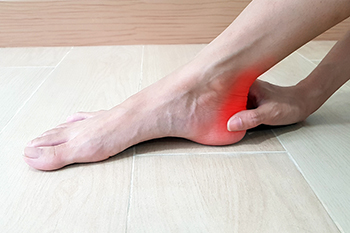

The Achilles tendon, a robust band of tissue connecting the calf muscles to the heel bone, plays a pivotal role in our ability to walk, run, and jump. However, this vital structure is not invincible. Achilles tendon injuries can be painful and debilitating. They often result from overuse, sudden changes in physical activity, or inadequate warm-up routines. Strains, characterized by mild to severe discomfort, may be a sign of overexertion or minor tears in the tendon. In contrast, a complete rupture, often accompanied by a sudden, sharp pain and a popping sensation, is a more severe injury requiring immediate medical attention. The road to recovery varies depending on the injury's extent, with treatments ranging from rest for minor strains to surgical intervention for more severe cases. If you experience an Achilles tendon injury, it is strongly suggested that you schedule an appointment with a podiatrist who can determine what the correct treatment is for you.
Achilles tendon injuries need immediate attention to avoid future complications. If you have any concerns, contact Dr. Edward D. Hutson of Easton, PA. . Our doctor can provide the care you need to keep you pain-free and on your feet.
What Is the Achilles Tendon?
The Achilles tendon is a tendon that connects the lower leg muscles and calf to the heel of the foot. It is the strongest tendon in the human body and is essential for making movement possible. Because this tendon is such an integral part of the body, any injuries to it can create immense difficulties and should immediately be presented to a doctor.
What Are the Symptoms of an Achilles Tendon Injury?
There are various types of injuries that can affect the Achilles tendon. The two most common injuries are Achilles tendinitis and ruptures of the tendon.
Achilles Tendinitis Symptoms
Rupture Symptoms
Treatment and Prevention
Achilles tendon injuries are diagnosed by a thorough physical evaluation, which can include an MRI. Treatment involves rest, physical therapy, and in some cases, surgery. However, various preventative measures can be taken to avoid these injuries, such as:
If you have any questions please feel free to contact our offices located in Easton, and Northampton, PA . We offer the newest diagnostic tools and technology to treat your foot and ankle needs.